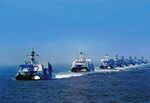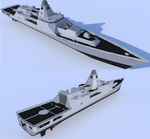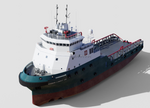KGLM Military
Greater Kaldana Colonial Navy
The KGCN maintains a fairly decent naval force, and said force is split into four main taskforces that can act in accordance with each other when deployed. Despite the nature of the colonial holding becoming a protectorate, the citizenry voted to keep the name as it was rather then change it to remember their heritage.
Providing sea-based security while concurrently waging a highly focused and agile offensive campaign, emphasizing the role of actionable intelligence, integrated allied forces if present, speed, maneuver, and deception. Much of this activity can be grouped under “maritime security operations,” reflecting a wide band of operational activities designed to secure and protect use of the seas from hostile threat.
The KGCN Navy also has the capabilities to accomplish a wide array of military operations. Such capabilities include wide-area sensing; communications and command and control; compliant and noncompliant boardings; precision strike; and self-defense.
KGCN Patrol Fleet (KGCNPF or PF)
- Offshore Combat Force (OCF) - responsible for the overall offshore combat, maritime patrol and territorial defense missions.
- Littoral Combat Force (LCF)- responsible for the overall coastal defense, littoral patrol and interdiction missions.
- Sealift Amphibious Force (SAF) - responsible for the overall naval sealift, amphibious deployment, and transport missions.
- Naval Meteorological and Oceanographic Center (NMOC or NAVMETOC) - responsible for the overall maritime research, hydrographical surveys and meteorological missions.
- Fleet Support Group (FSG) - responsible for the overall fleet support missions.
- Naval Air Wing (NAW) - responsible for overall aerial reconnaissance and maritime patrol operations, as well as air support and future anti-submarine operations.
- Submarine Group (SG) - responsible for future submarine and underwater operations, including training, doctrine development, and overall maritime submarine strategies of the navy.
- Fleet Training and Doctrines Center (FTDC) - responsible for the overall training, education and doctrine development for the newly enlisted and ranked members of the navy.
- KGCN Naval Legion (KCGN-NL) - the primary naval legionary, combined arms, and amphibious landing force of the navy.
- Naval Special Operations Command (NAVSOCOM) (formerly the Naval Special Operations Group) - responsible for naval special operations. The unit was recently separated from the KGCN Patrol Fleet, and is now a separate command as of 2019.
Naval Strategy
- Patience and dwell. Current KGCN military doctrine calls for overwhelming force and rapid maneuver, but the glubal war will require additional qualities. In many situations, naval forces will wait weeks, months, perhaps even years before striking. Such operations will involve patiently observing the environment to cultivate a rich understanding of sea and air traffic patterns, prepositioning ships to intercept terrorists at sea, and loitering offshore awaiting the proper time to strike key targets.
- Speed and precision. We also will need the ability to “sprint” when necessary to take out fleeting targets. This is best illustrated by strikes to kill hostile forces, or destroy hostile infrastructure and targeting mechanisms. The continuous networking of engagement-quality information will be critical to generating such speed, not only to guide weapons but also to allow real-time collaborative planning that generates the right amount of force at the optimal time and place.
- Timely intelligence and rapid analysis. The most important requirement of the global war setting is actionable intelligence. Our ability to find, fix, and kill hostiles from the sea is dependent on quality intelligence. To achieve it, we must integrate databases, streamline analysis, and develop information-routing aids that push vital information to the user when needed.
- Preempting the enemy. The KGCN Strategic Command prescribes the selective use of preemption. Toward that end, maritime forces provide the Emperor with valuable options, ranging from long-range precision strike to the landing of ground forces. Best of all, maritime preemption options provide the speed so vital to success in the global conflicts to come, without dependence on foreign basing or permission.
- Enhancing economic security and stability. Because a primary goal of our enemies is economic dislocation leading to political collapse, maritime forces must provide security to offshore economic infrastructure and trade. Defeat of seaborne enemy forces, is central to that effort. Embracing this mission will lead to important changes in how naval forces train and operate. In many ways, the capabilities and operating patterns we must adopt in the glubal conflicts to come. In the long-term struggle to enhance maritime security, small numbers of widely dispersed forces will dominate the battle space in their immediate vicinity, protecting vital assets and destroying those who would attack them.
Operational Initiatives
- Protecting critical maritime infrastructure. Increasingly, glubal economic growth and prosperity rely on secure sea spaces. Protecting key economic assets from attack will be a growing role for military forces in every theater.
- Protecting sea-lanes. Defending shipping—large and small—extends the “Sea Shield” over thousands of individuals whose economic well-being is critical to winning any glubal conflict. Protection of critical straits in concert with allied partners is central to this effort, as well, as piracy is on the increase in many parts of the wurld. Reported attacks on ships were nearly 40% higher in the first half of 2003 than in the previous year, approaching 6 attacks per 1,000 ships.
- Employing sea bases. Minimizing the permanent presence of ground forces outside the Principality has long-term advantages, particularly in the Ranke region. Consequently, the importance of mobile, sovereign, and secure sea bases will grow in the years ahead. Such sea bases will allow us to preposition strike and shield forces, as well as serve as staging points for logistics that draw on high-speed transportation vehicles to provide timely support around the wurld.
- Sustaining readiness. The nature of unconventional enemies and the Navy’s new fleet response plan demand sustained readiness to surge and strike quickly. To meet that challenge, carrier and expeditionary strike groups should implement Strike Group Readiness Teams—trained senior officer groups within the lifelines of the strike groups—to fully leverage training investment opportunities whenever and wherever they arise.
- Expanding international military education and training. Military leaders play important roles in shaping national policies. Sharing Haruspex values with foreign naval officers early in their careers, and maintaining contact with them as they gain seniority, is a wise investment that will cultivate allies in our long-term effort to integrate all nations into the international community.
- Establishing naval liaison elements. Enhancing security in littoral areas is a coalition effort best achieved with local authorities in an integrated and sustained manner. Successful littoral defense requires an intimate knowledge of operating areas, cultures, and languages. The presence of naval liaison officers at key ports will serve that end, increasing situational awareness, intelligence, and trust.
- Maximizing boarding capabilities. Successful counterterrorism efforts rely on speed of execution and continual readiness to seize the initiative. To strengthen those capabilities, we should integrate training efforts with our coalition partners to ensure boarding teams are highly interoperable and optimally prepared for any contingency. Exciting synergies also exist with the House Legions communities to provide enhanced firepower when the situation requires.
- Investing in unmanned surveillance assets. Terrorism relies on stealth. Consequently, defense against terrorism requires continual vigilance. Yet, sustaining effective and comprehensive surveillance is tremendously expensive and asset intensive. The time is ripe to invest in unmanned surveillance platforms that operate on, over, and below the surface of the sea, to augment intelligence collection currently accomplished by manned naval platforms such as submarines and maritime patrol and reconnaissance aircraft. The recent forward testing of the Ferret, an unmanned surface vehicle with infrared and electro-optical capability, is a step in the right direction.
- Strengthening joint and coalition interoperability. The timely sharing of information between joint and coalition forces is fundamental to coordinating effective operations. Pursuant to that goal, ongoing initiatives to expand and standardize Principality information-sharing tools such as Knowledge Web and the allied shared Battlenet system will pay big dividends in combat effectiveness.
KGCN Naval Craft
The KGCN has a focus on protecting its territorial waters and the vital sea lanes and has acquired vessels to better serve those needs.
Fast Attack Patrol Craft
Corvettes
| Image
|
Manufacturer
|
Designation
|
Variants
|
Type
|
Quantity
|
Country of Origin
|
Operators
|
Notes
|
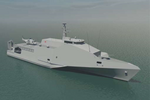
|
HIA
|
205 Ymekydun (Alligator) Class
|
|
Corvette
|
8
|
 Haruspex Haruspex
|
|
KGCN Primary territorial waters patrol vessel.
|
|
Minelayer & Sweeper
| Image
|
Manufacturer
|
Designation
|
Variants
|
Type
|
Quantity
|
Country of Origin
|
Operators
|
Notes
|

|
HIA
|
N5 Clyjyhkan (Scavanger) Class
|
|
Minesweeper and Patrol Vessel
|
14
|
 Haruspex Haruspex
|
|
KGCN sea-lane patrol vessel.
|
|
Destroyers
Frigates
| Image
|
Manufacturer
|
Designation
|
Variants
|
Type
|
Quantity
|
Operators
|
Notes
|
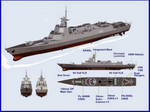
|
HIA
|
212 Cfunt (Sword) Class
|
|
Guided Missile Frigate
|
5
|
 Haruspex Haruspex
|
|
Apart of the buildup of the KGCN into a credible deterrent to hostilities and naval force in general.
|
|
Support Vessels
Sealift and Supply
| Image
|
Manufacturer
|
Designation
|
Variants
|
Type
|
Quantity
|
Country of Origin
|
Operators
|
Notes
|
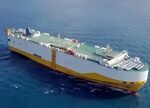
|
VCI-NRCD
|
Uqah-class
|
|
Roll-on/Roll-off cargo and logistics support
|
2
|
 Haruspex Haruspex
|
|
Received two vessels to aid in supply needs of the KCGN.
|
|
Replenishment Vessels
Specialized Vessels
| Image
|
Manufacturer
|
Designation
|
Variants
|
Type
|
Quantity
|
Country of Origin
|
Operators
|
Notes
|

|
VCI-NRCD
|
Crabynt (Shepard)-class
|
|
Hospital Ship
|
2
|
 Haruspex Haruspex
|
|
KGCN primary health and welfare vessel.
|
|

